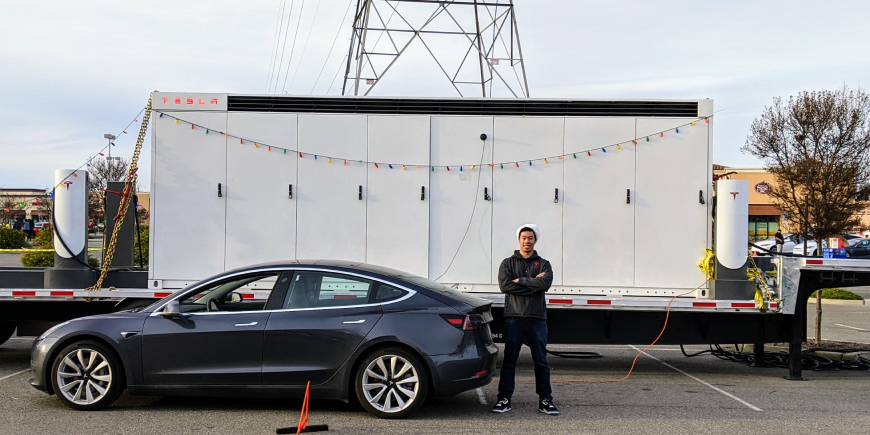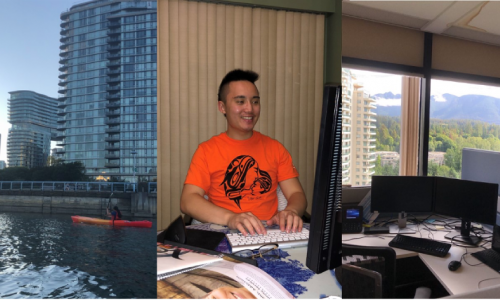
Working at Tesla was my number one dream since starting my Mechatronics degree at SFU in Fall 2016. I ended up joining the energy firmware team for DCDC converters at Tesla HQ, in Palo Alto. In this position, I worked on Tesla converters that are all designed and manufactured in house and have the highest power density and efficiency in the world, a crucial component in achieving the best EV range on the market. Working in power electronics was not something I predicted and getting here was a difficult path where I was never sure of my direction. However, the experience was both eye-opening and lifechanging. I would like share my experiences in hopes of helping others to land an internship in the Bay Area.
A Rough Start
Much like many students in the MSE program who face pressure towards acquiring a co-op term in my second year, I took whatever I could get and ended up being placed in a position where I did not have the applicable skills to make a significant impact in my role. Co-op is an opportunity to build your resume with achievements while having the support of resources such as an experienced team, tools and equipment, and time; 8 hours a day dedicated to your craft. Lacking the skills to take advantage of this, I have two major lessons I took from this experience that I would like to share with others:
-
With the possession of only second-year fundamentals, it may be worthwhile to consider waiting until your third year to receive the tools required to apply your knowledge in the field. For engineering disciplines, most applicable skills come in third year with the first and second being focused on theory. To one’s own discretion, this delay can present a much more fruitful and enriching co-op experience to really make the most out of your work term.
-
Independently learning through side-projects and club involvement is the key differentiation to stand out from the crowd, and to acquire technical skills not covered in academics. A great starting point is to look at your dream job description and start a side project involving some key skills highlighted in the description. Originally wanting to be a mechanical engineer, I joined SFU’s Team Phantom Formula SAE club. (Race car building competition open to students of any program). Through time and effort spent, I learned a some employable skills here.
Making the Most of my Second Co-op
Armed with the lessons of the first round, I took it upon myself to start building and experimenting outside of school and work. A few buzzwords I saw repeatedly and became interested in were 3D-printing and microcontrollers (programmable mini-computer). I bought a 3D-printer and started messing around with low-cost microcontrollers like Arduino and Raspberry Pi. These side projects enabled self-research and paved the way towards a path in digital electronics in my second co-op at Menrva Research Group. I was lucky to have joined midway through the startup of a biomedical wearable product and was able to experience the entire product development cycle with a small team. Being part of a small team allowed me to dip my toes in the full stack of electronics development of hardware, firmware, and software. Some key points that helped me make the most of this experience are outlined below:
-
If you’re enjoying your work and learning from it, work overtime, paid or unpaid. Maximize your time and experience from the co-op opportunity. Sticking around after work hours also allows you to hang out and get to know other co-workers, or to see what they are working on. I ended up becoming close friends with some great mentors, two of which were previous Tesla interns! Sharing a similar passion, they ended up guiding me towards interning there myself.
-
Don’t let the fear of failure prevent you from trying new things. One of the fastest ways to learn is to throw yourself into uncharted territory. I offered to take up a large project in which I had no experience in, and with the support of my mentor, learned a lot. Without taking the leap, I would not have been able to get such a broad experience from this work term. Do your research and then seek support from others with experience to get the job done if needed.
Landing at Tesla
The two most crucial aspects that helped me land my position at Tesla were a loaded resume with applicable skills and mentorship from previous Tesla interns. These two elements paved the way through the interview and hiring process. Upon arrival, I was dazed by the innovative pace of the company. It was like a Wall Street trade floor but full of engineers. After the burn-in period of culture shock and learning pressure, working at Tesla has been the most rewarding experience thus far. Some highlights include the bring up of several automated test stations (computers and equipment that automatically run tests), implementation of new features into Megapack (industrial battery storage) and Supercharger V3 (rapid vehicle charging), and on-site support for a mobile vehicle charging prototype (article’s picture highlight). Over the next couple of months, I will be working on the integration of our DCDC converters into Tesla Semi Truck charging.















